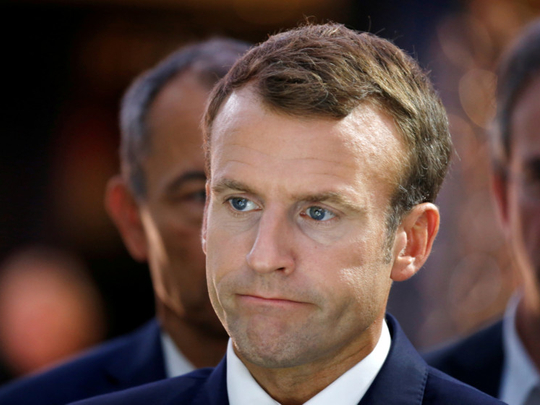
The presidency of Emmanuel Macron is in turmoil. Recurrent declines in popularity means that those satisfied with his presidency stand at 27 per cent (as per the latest approval rating)— a level similar to former President Francois Hollande after 18 months in office. As of now 60 per cent of the French have “a negative opinion” of Macron, and only 19 per cent of the French “see him positively”.
After such a flamboyant start, what happened? Macron was elected to make changes and launch reforms that none of his predecessors was brave enough to do. Wasting little time, he began by reforming the ‘working code’ and the status of the French Railways dependants, real milestones previously considered ‘not achievable’. Macron also made other moves that favoured entrepreneurship and dynamism.
However such moves are supposed to translate into higher growth, lower unemployment, increased purchasing power, but none of that seems to have taken place till now.
More importantly, Macron initiated a ‘style’ which was enthusiastically celebrated during his campaign, but which moved into an attitude that ended up being jaded. Typically the French mistrust whoever they consider too ‘brilliant’, which they often relate to being ‘arrogant’. In French politics an ‘arrogant’ person is someone who simply thinks differently from you.
Macron’s slip started to show when he started telling people off. He told an unemployed person during an open-doors event at the presidential palace in September “to cross the road” to find a job. On another occasion he commanded a teenager to call him ‘Mr President’(and not his shortened first name). Both instances (caught on tape) didn’t register well with the public. However real damage started when the so-called “Benalla Affair” hit the headlines. Alexandre Benalla is a member of the Elysee Palace staff, recruited to coordinate the president’s security. He was filmed during the May 1 demonstrations knocking down a demonstrator in Paris. The Elysee Palace overlooked the matter until a journalist unveiled the whole story. A public backlash followed. The National Assembly and the Senate set-up commissions to look into it. The press took Macron to the cleaners.
It appears that his image is firmly dented but there is hope. Around 39 per cent of the French would like Macron “to recognise his mistakes”; they consider him as “cut-off from the French” or “locked in his certainties”. 71 per cent of them would even wish he “takes better into account the proposals of the other political parties” (one may wonder which ones?). To conclude, Macron should tell the French he “listens to them”
As things go, the French president will obviously go on reacting in the coming weeks, starting with a significant ministerial reshuffle, and one may see four main ways to reverse a degraded image. One is to improve the purchasing power of the French, which means reducing taxes — and consequently reduce public spending: a move has started but has thus far concentrated on ‘inactive people’ (the retired mid-class population); a more decisive action on public spending is needed. Another one is to go on reducing unemployment: the prevailing situation has started to reverse but there are still too many blockages. A third one is to fight illegal immigration more efficiently, a difficult task to say the least.
On foreign policy, it is unlikely Macron will change anything in what he has been (or not) doing these last months. The ‘special’ dialogue with US President Trump led nowhere. Neither did the French-Russia relationship grow. In the Middle East, he proved that France doesn’t have much say on the Syrian situation. As far as the Palestinian issue is concerned, Macron has confirmed to President Mahmoud Abbas that the “two-state solution is still alive”, when everyone knows that in reality Israel has substituted the debate around its illegal occupation with the “fight against terrorism” narrative.
On a more general note, Macron’s silver lining is that he doesn’t face a tough opposition at home. France’s socialist party has more or less disappeared; the right is unable to talk in one single voice; and the two far-left and far-right groupings appear meek. Most observers are now waiting and watching if Macron will recover before next spring’s elections to the European Parliament.
Luc Debieuvre is a French essayist and a lecturer at IRIS (Institut de Relations Internationales et Strategiques) and the ‘FACO’ Law University of Paris.










